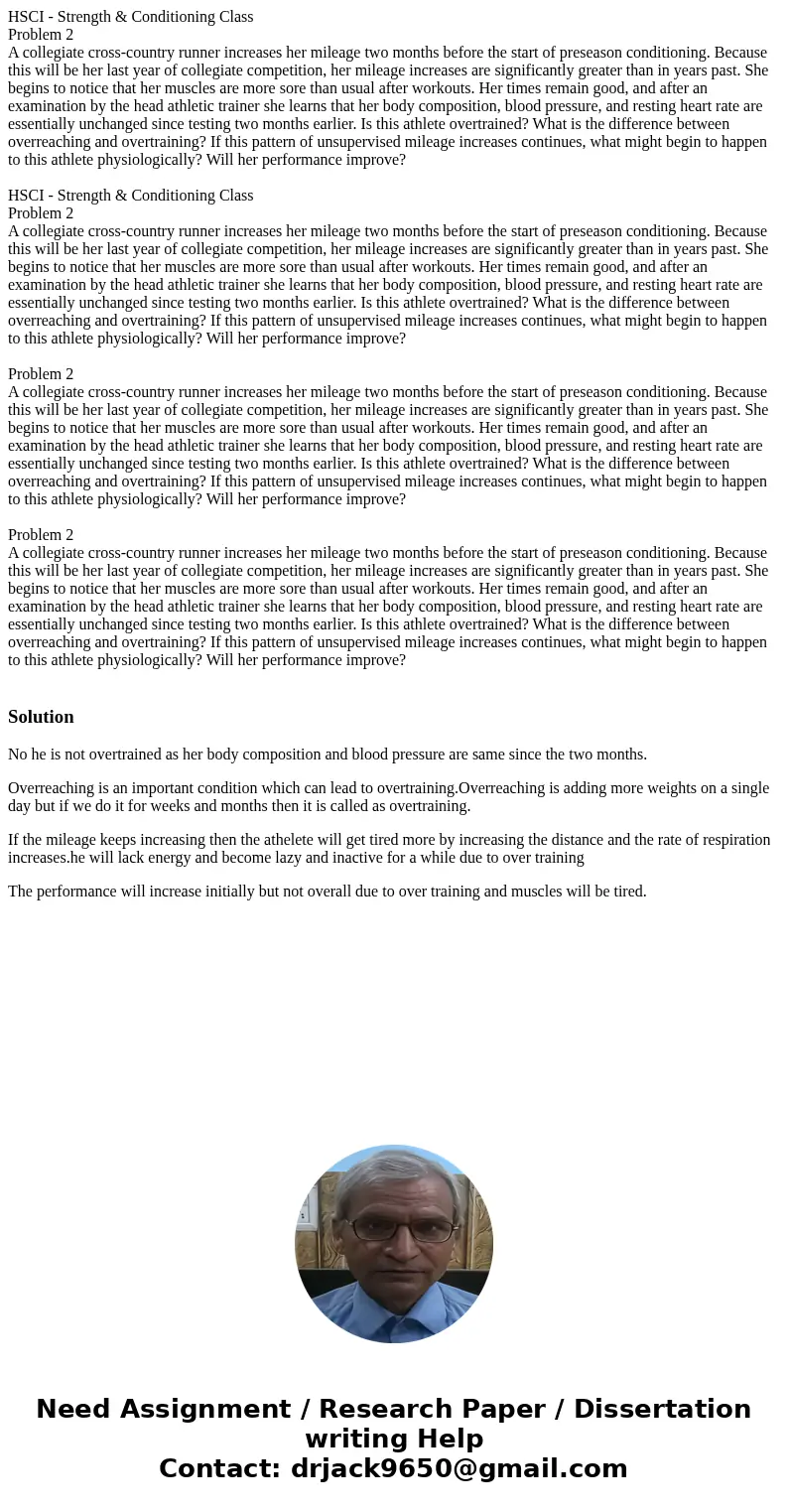HSCI Strength Conditioning Class Problem 2 A collegiate cr
HSCI - Strength & Conditioning Class
Problem 2
A collegiate cross-country runner increases her mileage two months before the start of preseason conditioning. Because this will be her last year of collegiate competition, her mileage increases are significantly greater than in years past. She begins to notice that her muscles are more sore than usual after workouts. Her times remain good, and after an examination by the head athletic trainer she learns that her body composition, blood pressure, and resting heart rate are essentially unchanged since testing two months earlier. Is this athlete overtrained? What is the difference between overreaching and overtraining? If this pattern of unsupervised mileage increases continues, what might begin to happen to this athlete physiologically? Will her performance improve?
HSCI - Strength & Conditioning Class
Problem 2
A collegiate cross-country runner increases her mileage two months before the start of preseason conditioning. Because this will be her last year of collegiate competition, her mileage increases are significantly greater than in years past. She begins to notice that her muscles are more sore than usual after workouts. Her times remain good, and after an examination by the head athletic trainer she learns that her body composition, blood pressure, and resting heart rate are essentially unchanged since testing two months earlier. Is this athlete overtrained? What is the difference between overreaching and overtraining? If this pattern of unsupervised mileage increases continues, what might begin to happen to this athlete physiologically? Will her performance improve?
Problem 2
A collegiate cross-country runner increases her mileage two months before the start of preseason conditioning. Because this will be her last year of collegiate competition, her mileage increases are significantly greater than in years past. She begins to notice that her muscles are more sore than usual after workouts. Her times remain good, and after an examination by the head athletic trainer she learns that her body composition, blood pressure, and resting heart rate are essentially unchanged since testing two months earlier. Is this athlete overtrained? What is the difference between overreaching and overtraining? If this pattern of unsupervised mileage increases continues, what might begin to happen to this athlete physiologically? Will her performance improve?
Problem 2
A collegiate cross-country runner increases her mileage two months before the start of preseason conditioning. Because this will be her last year of collegiate competition, her mileage increases are significantly greater than in years past. She begins to notice that her muscles are more sore than usual after workouts. Her times remain good, and after an examination by the head athletic trainer she learns that her body composition, blood pressure, and resting heart rate are essentially unchanged since testing two months earlier. Is this athlete overtrained? What is the difference between overreaching and overtraining? If this pattern of unsupervised mileage increases continues, what might begin to happen to this athlete physiologically? Will her performance improve?
Solution
No he is not overtrained as her body composition and blood pressure are same since the two months.
Overreaching is an important condition which can lead to overtraining.Overreaching is adding more weights on a single day but if we do it for weeks and months then it is called as overtraining.
If the mileage keeps increasing then the athelete will get tired more by increasing the distance and the rate of respiration increases.he will lack energy and become lazy and inactive for a while due to over training
The performance will increase initially but not overall due to over training and muscles will be tired.

 Homework Sourse
Homework Sourse